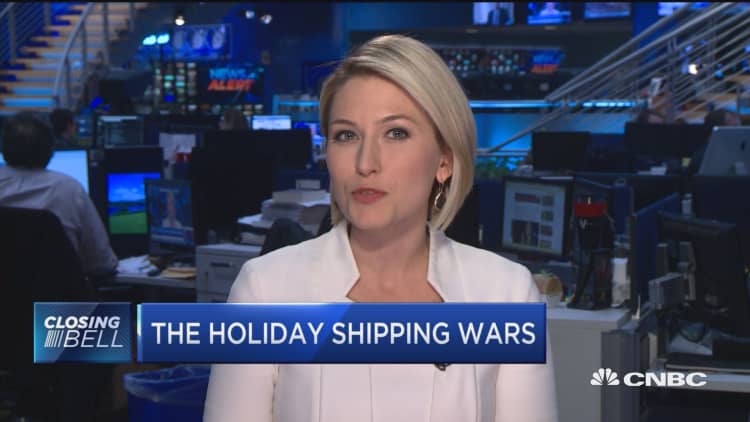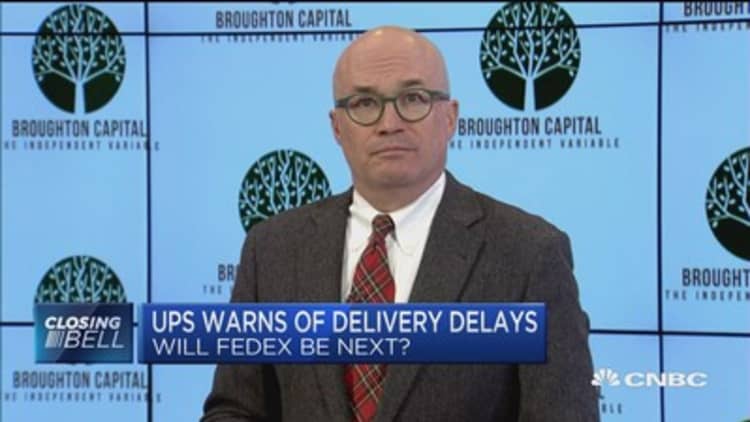Package delivery companies and retailers alike are gearing up for another surge in online orders — following a record-breaking Cyber Monday — and that doesn't come without a few bumps in the road.
One way to avoid a last-minute sprint at the end of the busy shopping season is for retailers to push their shipping deadlines earlier, encouraging consumers to ring up final purchases sooner rather than later. That strategy already appears to be transpiring this year.
Early results from a study by customer analytics firm StellaService show that Dec. 19 is the most common deadline posted by retailers promising standard or free shipping for delivery by Dec. 25. That compares with Dec. 21 last year, and a common cutoff date of Dec. 20 in 2015.
"Christmas also falls on a Monday this year, which means one less day to get those packages when they're promised," StellaService analyst Carol Krakowski told CNBC. "You can't deliver on Christmas Eve."
To be sure, retailers are also likely strategically setting earlier deadlines to avoid last-minute mishaps, she said. And in the week leading up to Dec. 25, some companies will try to appear "customer friendly" and push back their cutoff time by a day or two, Krakowski added. For now, a Dec. 19 cutoff gives them some wiggle room.

This holiday season, Adobe Analytics, which measures 80 percent of online retail sales from 100 major U.S. retailers, is calling for a record $107.4 billion in e-commerce revenue. By Dec. 5, $65.15 billion had already been spent online, the group found, with each day since the start of November raking in more than $1 billion in digital sales.
On Cyber Monday this year, a record $6.59 billion was spent online, according to Adobe. In turn, United Parcel Service said some of those deliveries were being delayed, forcing the company to shift resources and employees to certain markets, and setting off an industry-wide alarm for more problems to come.
UPS' "operations have returned to our original peak operating plan after the initial cyber week surge that exceeded our operating plans," a company spokesman told CNBC Monday.
As previously announced, UPS still expects to deliver roughly 750 million packages this holiday season, which is up about 5 percent from 2016's volume of more than 712 million packages.
"The vast majority of packages will be delivered in accordance with the service commitments for the specified time-in-transit," the UPS spokesman added.
Meantime, logistics rival FedEx is calling for moving a record-breaking 317 million shipments between Black Friday and Christmas Eve, up about 12 percent from a year ago.
"We plan and collaborate closely with our customers year round and engineer our networks to be ready to meet the significant surge in demand for residential deliveries," a company spokeswoman told CNBC. "FedEx is well-positioned to meet anticipated record demand."
FedEx is also encouraging customers to consider picking up at their more than 10,000 "hold" locations across the country, which include Walgreens and Kroger stores. This allows FedEx's employees to make more deliveries en masse, saving time and fuel.
In the final days before Christmas, UPS' challenges early on have many people monitoring for the next major mishap.
"UPS had a dramatic recovery on that," ShipMatrix President Satish Jindel told CNBC. "The increase in online sales is going to continue to be higher, as brick-and-mortar retailers are making it less desirable for people to come into their stores."
Free-shipping offers are becoming increasingly appealing, and store assortments are being shrunk as online offerings are mushrooming, Jindel added.
On the whole, after Cyber Monday, package delivery services ended up with "a lot more packages in the system than they were advised by customers," ShipMatrix found. Even just compared with last year, online order volume is becoming more impossible to forecast as the industry sets a new precedent.
"Brands are feeling the impact of having an even better year than they planned for," Spring President Marshall Porter told CNBC. "The downside is it puts pressure on operations and logistics."
Spring's website houses big-name brands such as Gap, Ralph Lauren and Bobbi Brown. Porter said some retailers are "crushing it," where they clearly planned for the right capacity. Others are still struggling to predict sales, he said, and Spring has noticed a slowdown overall between the time an order is placed by a customer and the time it's finally shipped out.
"For brands, there's nothing worse than missing ... a Christmas delivery," Porter said. "Brands are really doubling down, making sure they make their deadlines."
WATCH: FedEx has invested more heavily in infrastructure than UPS



